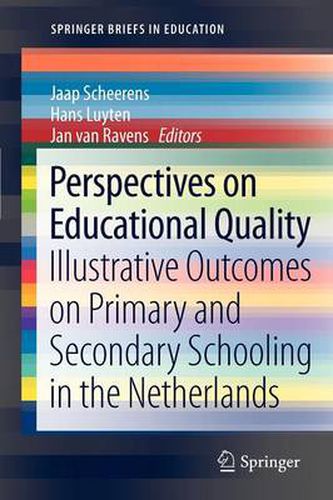Readings Newsletter
Become a Readings Member to make your shopping experience even easier.
Sign in or sign up for free!
You’re not far away from qualifying for FREE standard shipping within Australia
You’ve qualified for FREE standard shipping within Australia
The cart is loading…






This title is printed to order. This book may have been self-published. If so, we cannot guarantee the quality of the content. In the main most books will have gone through the editing process however some may not. We therefore suggest that you be aware of this before ordering this book. If in doubt check either the author or publisher’s details as we are unable to accept any returns unless they are faulty. Please contact us if you have any questions.
The quality of education is a term that is frequently used in public debates. Understood in the sense of education being generally okay , or rather, most frequently, as not okay . Perhaps there is an overruling nostalgic view that formerly education was better than today. In scholarly discourse there are those who maintain that the quality of education is an illusive term, with varying interpretations in different settings and by different stakeholders.
In this book the complexity of the concept of education quality is recognized, but a conceptual framework is presented that makes quality, despite its complexity, amenable to rational and empirical analysis. Productivity, equity, effectiveness, efficiency and responsiveness of education systems are seen as key facets of quality. A concrete set of indicators is presented that makes for the measurement of these quality facets. In the second part of the book the quality framework is applied to an analysis of the quality of education in the Netherlands. Common sense in the Netherlands is dominated by the view that the quality of education is a course for serious concern. Some recent quality reviews take the same pessimistic outlook. However, the current overview of indicators on the Dutch system, seen from an international perspective, presents a picture that is much more positive. Still there is always room for improvement, in the case of the Netherlands this should probably be sought in diminishing the selectivity of the system as a way to improve participation in higher education.
$9.00 standard shipping within Australia
FREE standard shipping within Australia for orders over $100.00
Express & International shipping calculated at checkout
This title is printed to order. This book may have been self-published. If so, we cannot guarantee the quality of the content. In the main most books will have gone through the editing process however some may not. We therefore suggest that you be aware of this before ordering this book. If in doubt check either the author or publisher’s details as we are unable to accept any returns unless they are faulty. Please contact us if you have any questions.
The quality of education is a term that is frequently used in public debates. Understood in the sense of education being generally okay , or rather, most frequently, as not okay . Perhaps there is an overruling nostalgic view that formerly education was better than today. In scholarly discourse there are those who maintain that the quality of education is an illusive term, with varying interpretations in different settings and by different stakeholders.
In this book the complexity of the concept of education quality is recognized, but a conceptual framework is presented that makes quality, despite its complexity, amenable to rational and empirical analysis. Productivity, equity, effectiveness, efficiency and responsiveness of education systems are seen as key facets of quality. A concrete set of indicators is presented that makes for the measurement of these quality facets. In the second part of the book the quality framework is applied to an analysis of the quality of education in the Netherlands. Common sense in the Netherlands is dominated by the view that the quality of education is a course for serious concern. Some recent quality reviews take the same pessimistic outlook. However, the current overview of indicators on the Dutch system, seen from an international perspective, presents a picture that is much more positive. Still there is always room for improvement, in the case of the Netherlands this should probably be sought in diminishing the selectivity of the system as a way to improve participation in higher education.